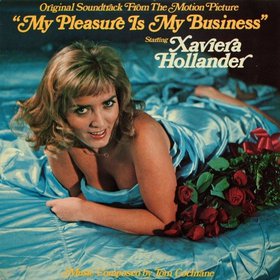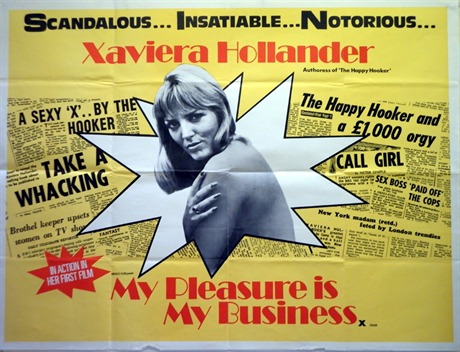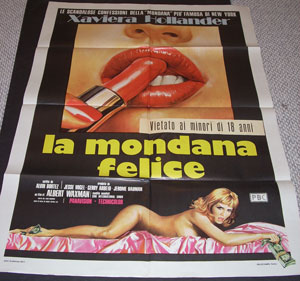From Monthly Film Bulletin, April 1975 (Vol. 42, No. 495). — J.R.
My Pleasure Is My Business
Canada, 1974 Director: Albert S. Waxman
Deported from America by a U.S. senator who wants to keep her
away from his son-in-law, Gabrielle, a promiscuous movie star and
sexual liberationist, is flown to the country of Gestalt. After
confering with his aides, the corrupt Prime Minister decides to admit her
into the country, thereby hoping to deflect some of the charges of
immorality laid against the government. Gabrielle is accorded a
luxurious suite by a North African hotel manager in exchange for
the promise of sexual favors, and applies for a job as sexual
therapist with pudgy psychiatrist Freda Schloss, who turns out to
want the therapy herself. While the Prime Minister and his
henchmen plot ways-of arresting her for prostitution,
Gabrielle picks up an artist in a cafe and makes love with
him in his flat, looks up an old French girlfriend who acts
in porn films (along with the local police chief), and attends
a wild costume party given by another old friend. Cornered
by the police when she returns to her hotel, Gabrielle
persuades them to drop the charges by reminding the
police chief of his skin-flick activity. After a subsequent police
chase, she appears on local television to express her liberal views on
masturbation, enraging the Prime Minister, who orders an immediate
arrest; but the police who raid her room find the Minister’s wife
there in bed with another man. Triumphant, Gabrielle and all her
friends enter the Minister’s house to continue their sexual frolics.

Surrounded by consistently unfunny actors indulging in knockabout
slapstick so overdirected that it almost makes Mel Brooks look
like Robert Bresson, Xaviera Hollander — the ex-prostitute authoress
whose reputation this film is built round — displays a surprising
amount of poise and assurance. It may be that prostitution itself
provides a fair measure of acting experience; whatever the reason,
Hollander manages to hold her own in a vulgar farce where
practically everyone else is straining painfully for effects. The
nonsensical, slapdash plot seems little more than a stab at emulating
What’s New, Pussycat? (with “Dr. Schloss”, for instance, assuming
the Peter Sellers part), and despite a reasonable amount of high
spirits, the shrill ugliness and witlessness of the Gestalt cabinet
scenes are sufficient to sink this shaky vehicle without a trace.
Before it vanishes, however, Hollander’s italicized star treatment —
remotely akin to Frank Tashlin’s celebration of Jayne Mansfield,
and Mae West’s delivery of one-liners (without the lines) — affords
the actress some opportunity to do justice to the movie’s modest
thesis: that simple relaxation in the midst of hysteria is a desirable
achievement.
JONATHAN ROSENBAUM


